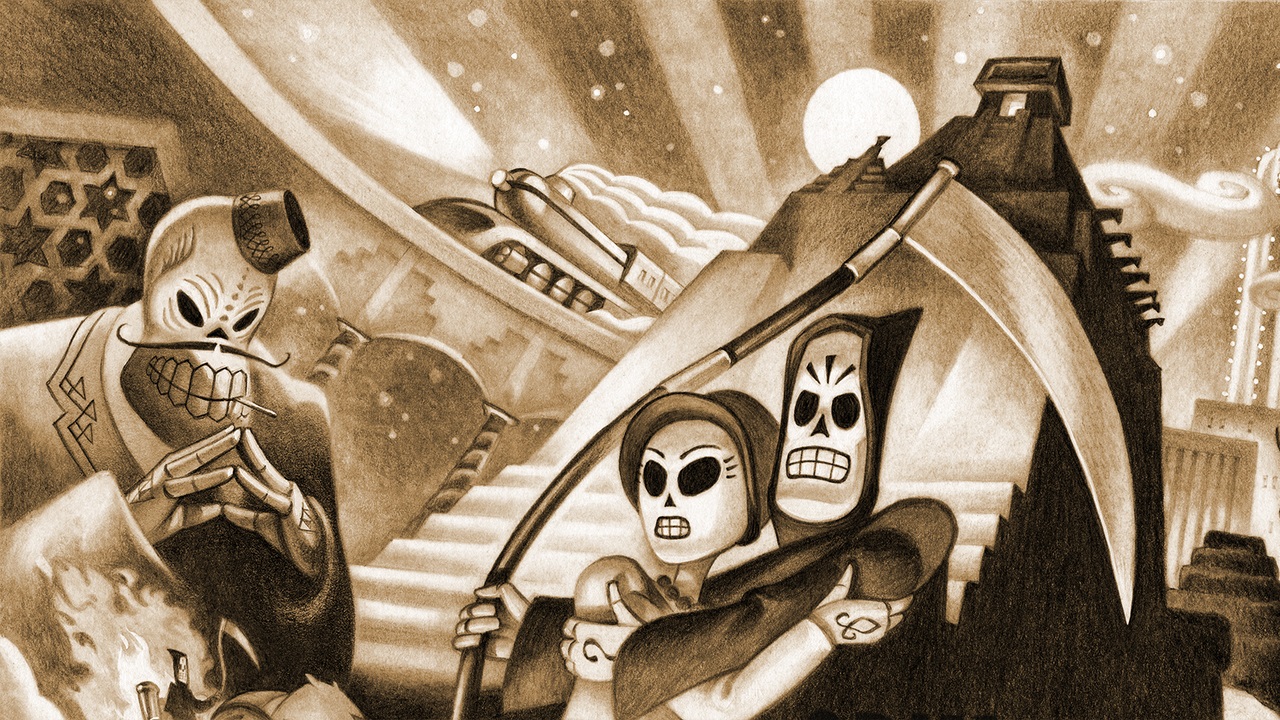First things first. A fandango, for those who don’t know, is a lively couples’ dance from Iberia. Iberia, for those who don’t know, is the European peninsula housing the likes of Spain, Portugal, Andorra, Gibraltar and a few other countries in the Mediterranean region. Grim Fandango, while featuring neither singing nor dancing, is a surprisingly upbeat game originally published by LucasArts.
Despite receiving almost unanimous praise and critical acclaim upon its release back in 1998, Grim Fandango was a massive financial flop. Famously expensive to make and released at a time when the point-and-click genre was in something of a crisis due to the rise of 3D gaming and first-person shooters, its failure at retail prompted publisher LucasArts - best known for some of the most influential games in the history of the genre, from Day of Tentacle and Monkey Island to The Dig and Sam and Max Hit the Road - to cease all future production of adventure games, precipitating a shift in focus toward Star Wars spin-offs. And we all know what happened from there - a flood of substandard cash-ins like the execrable Yoda Stories, punctuated by rare gems like Knights of the Old Republic and Republic Commando.
Fast-forward to more recent years, and the point-and-click genre, once thought dead by the likes of EA, is enjoying a newfound love thanks to the advent of touch-screen gaming, digital releases of classic games, and a number of great indie adventures. In addition, LucasArts is no more, following their acquisition by Disney back in 2012. As a result, Tim Schafer, now head of Double Fine, finally got the green light to create a remastered version of the game after trying unsuccessfully to get permission from his former employer for a number of years, with a little help from Sony’s wallet. Sorry, Xbox-ers, but this one’s a Sony console excluse - at least for the time being.
So, that’s the story of Grim Fandango. For newcomers to the game who missed growing up with everyone telling you that you should play a game you can’t get your hands on, you’ll no doubt be wondering what the game is all about.
You play Manuel “Manny” Calavera, main character and protagonist of Grim Fandango. Manny is a both the Grim Reaper and a travel agent for the Department of Death; you’d expect this to be a fairly exciting job, but since this is a government job, you’d be surprised. Manny gets sent to the Land of the Living – a thoroughly creepy place to be sure – to pick up the recently deceased, and bring them back to the Land of the Dead where you can sell them travel packages to get them to through the afterlife.
Your currency here is basically the deeds you’ve performed in life; if you lived a good life, you can travel via the Number Nine train – 4 minutes to the Ninth Underworld. Next stop: probably heaven, but who knows?? If you were a less than honorable person, your most affordable option is to cross the Land of the Dead on foot – which takes about 4 years as you try not to get eaten by flaming beavers, get lost or eaten in the Sea of Lament, or get yourself ‘sprouted’ by the criminal underworld who gave up trying to get into heaven/hell. As you’d expect from a Spanish-sounding game about dead people, our game starts on el Dia de los Muertos (the original Spanish name for Land of the Dead). Everyone has the day off to visit their family in the Land of the Living; everyone, that is, except Manny and the rest of the DoD of course.
This is where I had my very first problem with Grim Fandango. It may be a small, unnoticable thing to most people, but I’m hard of hearing. When you boot up Grim Fandango for the first time the game immediately defaults to no subtitles; as a result, I saw people talking but wasn’t able to hear what they were saying. So I hit Escape to access the menu and turn them on, as you tend to do in most PC games these days. Unfortunately, instead of bringing up the menu, the game skipped the intro cutscene - without any confirmation prompt - to see our protagonist standing in his office, wearing something completely different, but still talking to… someone? Frustrated by the immedite disregard for my disability, I turn the subtitles on and hit New Game. That’s is just annoying, and I really wish games would stop doing it; either turn subtitles on by default, or start the game with a New Game/Options screen. [pullquote]A word of advice, Mr Schafer: Don’t make your game unnecessarily annoying for the disabled – that’s just not cool.[/pullquote] Granted, I’m in the minority here, and many players won’t have any problem; but there’s simply no excuse these days to neglect what is still a large amount of gamers, minority or not. Even at the time of its original release it was unacceptable, with other games from 1998 featuring excellent support for players with hearing difficulty - Half-Life being an excelent example.
Anyway, Manny, frustrated with only getting crappy clients who were horrible in life, isn’t earning much commission. The weird thing is that the office big-shot, Domino, is scoring nuns and earning fat commissions with every client, which will allow him to work off his time in the office quicker; you see, once Manny works off this supposed debt, he earns his way onto the Number Nine, and out of the Land of the Dead. As a result, and partly because Domino is a bit of a dick, Manny starts poking around, soon finding himself embroiled a grand noir-esque mystery thriller.
If this game sounds delightfully barmy, you’re pretty much dead-on. Grim Fandango is one of those old-school point-and-click adventures where puzzle solving is more akin to mental backflips than anything else, though thankfully with the exception of one or two needlessly frustrating sections (mazes are never a good thing in any point and click adventure), most do have logical solutions.
Many adventure games these days are guilty of excessive hand-holding or negate their challenge through a hint system that literally places the entire solution to the game within clicking distance (Broken Sword 5 while largely excellent, was particularly guilty of this). So it’s refreshing to play something that requires genuine thought. That said, the few genuinely frustrating sections saw me Googling for a walkthrough because I didn’t have a week to play through the game and figure it out myself through random trial and error. Veterans will know exactly which sections I’m talking about here.
Unfortunately, the inventory system is pretty damned hellish. When you have a dozen items and you’re trying to figure out which one interacts with this particular environment at this particular moment, it’s a chore to slowly cycle through your entire inventory, one item at a time. Grim Fandango was released 8 years after Monkey Island, but despite being the older game, it handled inventory management much better.
While this updated version certainly looks better, don’t be mistaken; this is far from a full-scale remake. Consider it more an attempt to update the game for modern machines. Backgrounds are still low-resolution and the game retains its original 4:3 aspect ratio, presumably because the cost of completely remaking them in widescreen with new assets would have been prohibitively expensive, and access to the original files is all but impossible at this point. In fact, Schafer’s team was happy to build this Remaster using both the original assets he could collect and community-made mods.
“There was a guy, Tobias Pfaff, who made a point-and-click version of the game, which is something we didn’t do at the time because I was so into console games,” Schafer explained to Kotaku back in 2011. “I was playing Mario 64 and Final Fantasy 7, and I just wanted to push characters around with a stick. Clunky tank controls! But looking back, I’m like, ‘Why didn’t I even make point-and-click an option?’ So Tobias did that, and we had him come in and he volunteered to share his code with us.”
Both control schemes are there in the Remaster though, and you can switch between them at any point if you so choose. The hi-res models frequently means that characters and objects stand out rather jarringly from the environment. Thanks to the new, more traditional point-and-click control scheme, it certainly controls a lot better than it did before. There’s an achievement for playing the whole game the old way if you choose to do so, but that’s really for completionists only.
So that’s the controls and the visuals covered; how does it sound? Well, the answer is that it still sounds great. The writing and voicing are just as spectacular as they were back then, and there are some genuine laugh-out-loud moments.
Double Fine decided to go the whole hog and fully orchestrate the soundtrack this time with the the Melbourne Symphony Orchestra (who you may remember from Double Fine’s Broken Age), in order to make it as good as possible. There’s South American folk, jazz, bebop, swing, and even some big band music thrown in for good measure. Grim Fandango sounds as lively as the name implies, and the new version even includes a developer commentary for those of you who get a particular kick out of that (though there are some spoilers present when discussing some of the puzzle design, so you might want to avoid listening to it all on your first playthrough, if you never played the original).
So how do I rate Grim Fandango overall? Well, the humor is equal parts light and dark which greatly appealed to me, and if you’ve read this far the chances are it’ll most likely appeal to you, too. The visual nips and tucks are largely well done given the small budget, and it sounds fantastic. Apart from the occasional issue with Manny walking through the corner of a wall, and that initial issue with the subtitles, there really isn’t much to complain about. Some puzzles are pretty obscure at times, but let’s be fair: if you’re playing Grim Fandango, you aren’t playing it because it’s even remotely normal.
If you’re a fan of point-and-click adventures Grim Fandango isn’t a game you want to pass up. The old LucasArts games have a certain panache that makes most of them timeless, and the Remaster on offer here is further evidence of that. Grim Fandango is both the essence of LucasArts and Double Fine, and the very soul of what point-and-click adventures used to be.
When I die, if Manny Calavera isn’t my travel agent I’m going to be one disappointed dead guy (or, more likely, just dead).


